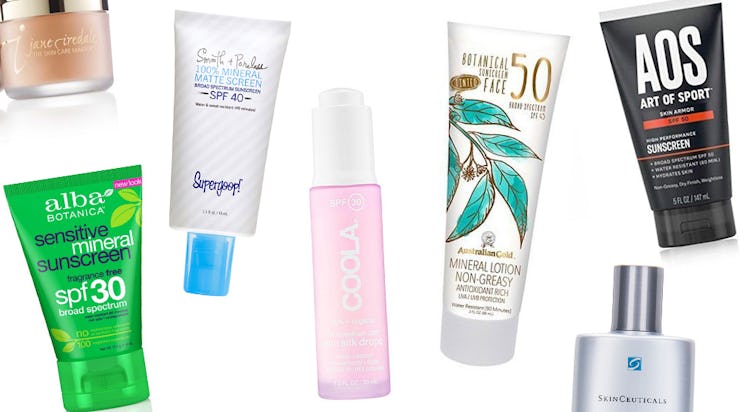
12 Coral Reef-Safe Sunscreens That Keep Your Skin & The Planet Safe
In the past, I chose my summer sunscreens based on three factors only: Pricepoint, SPF factor, and occasionally, how cute the packaging was. I know, I know, but I was young and naive! Now that I realize how much my sunscreen choices can affect the world around me, I've rounded up the best reef-safe sunscreens and talked to top dermatologists on why using these products is so important. Prior to this year, I was totally unaware of coral bleaching caused by active ingredients in chemical sunscreens, and now that the FDA is taking strides to make change and educate users, I'm determined to do my part and spread the word. Read on for all the deets, plus dermatologist tips and recommendations for your new go-to sunscreens.
Seeing the words "reef friendly" a lot and not totally sure what they mean? Allow Lian Mack, MD, a board certified dermatologist based in New York, New York, to break it down for you. "A recent law in Hawaii, prohibiting the use of sunscreen containing oxybenzone and octinoxate is slated to take effect in January 2021," Dr. Mack explains. "A study done in 2016 revealed that baby coral exposed to oxybenzone and octinoxate, commonly used chemical sunscreen, were more vulnerable to infection and developed DNA abnormalities that affected their growth," she elaborates. Wow. "Recognition of the effects of global warming, pollution, and other environmental factors have contributed to a heightened awareness of the need to protect the Earth," Dr. Mack adds, and to think, just changing up my susncreen preferences could make a difference.
Luckily, brands have really stepped up to the plate when it comes to providing fab reef-save options, according to Marnie B. Nussbaum, MD, a board certified dermatologist based in New York, New York, who says great mineral options are aplenty. "Mineral-based sunscreens containing titanium and zinc are much better for the environment," Dr. Nussbaum explains, "However, make sure they are not nano-sized particles as these tiny molecules can be ingested by coral." Noted.
And as Dr. Mack points out, we're the only ones who can help our Earth. "Protecting our planet is important. Protecting ourselves against skin cancer is also important," she says. "We have so many options for protecting our skin - rash guards, UPF (Ultraviolet Protection Factor) clothing, physical sunscreens. We only have one planet Earth." I mean, she's got a point.
So, what are the dermatologists' faves? For Dr. Mack, it's the Jane Iredale Powder-Me SPF Dry Sunscreen SPF 30 ($47, janeiredale.com):
"It contains a 17% titanium dioxide. Unlike oxybenzone, octinoxate, avobenzone, and otisalate, titanium dioxide is listed by the FDA as one of only two physical sunscreens," Dr. Mack shares. "The best reef sunscreens are those that contain physical UV blockers," she adds.
As for Dr. Nussbaum, she gravitates towards the SkinCeuticals Physical Fusion UV Defense SPF 50 ($34, dermstore.com) for her face, and the Colorescience Sunforgettable Total Protection Body Shield SPF 50 ($45, dermstore.com) everywhere else:
Need a few more options? Like I said, the beauty industry has the topic of reef-safe formulas top of mind right now, so it couldn't be easier to find an SPF that suits your skin and planet Earth, too. Check out a few of the most popular picks below.